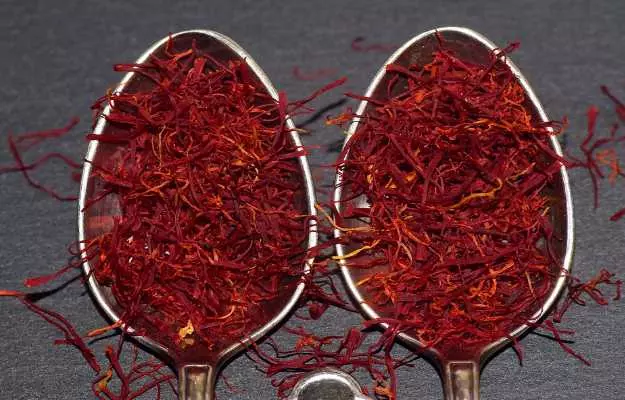Popularly known as ‘red gold’, saffron is one of the most valuable and costly spices in the world. This is because the aromatic bright red colour strands are hand-harvested from the flowers of the Crocus sativus plant.
Regardless of the price, the sweet aroma of this spice makes an important part of several traditional dishes all around the globe ranging from risotto, payasam, paella and kheer. Saffron is also used for seasoning dishes such as biryani, cakes, and bread.
Being an aromatic plant, saffron is commonly used in perfumes and cosmetics. Saffron is known to have been used in China and India as a fabric dye and also as a sacred item, often being used for religious purposes
Saffron has been used in traditional, alternative systems of medicine for ages. It is rich in antioxidants and other plant-derived compounds, which benefit the immune system and promote good health. Saffron is also used as an antiseptic, digestive, antidepressant and anticonvulsant. Additionally, this spice is also rich in minerals such as potassium, calcium, iron and essential vitamins such as vitamin A, and vitamin C.
Did you know?
Saffron, as we know it, is actually the dried orange-red stigma of the Crocus Sativus flower.
Saffron is harvested only once in a span of a few years. 1 kg of saffron consists of approximately 1,60,000 to 1,70,000 tiny flowers. The best saffron is recognized by its uniformly long threads and an all-red colour. Mixing saffron with water or any liquid gives the liquid a golden yellow colour, making it look rich and attractive.
Some basic facts about Saffron:
- Botanical Name: Crocus sativus
- Family: Iridaceae
- Common Names: saffron, kesar, zafran
- Sanskrit Name: केशरः (Kesara), कुङ्कुमति (Kunkumati)
- Parts Used: The saffron spice sticks that we use come from the stigmas of the flower which are harvested by hand and then dried and stored for future usage.
- Geographical distribution: Saffron is believed to have been cultivated first in Greece. Later it spread to Eurasia, Latin America, and North Africa. Iran is the largest producer of saffron, accounting for more than 94% of the world’s total saffron production. In India, saffron is cultivated in Jammu & Kashmir and Himachal Pradesh, with Jammu & Kashmir being the largest producer of the plant in the country.
- Interesting Fact: The first colour of the tricolour Indian flag is inspired by the colour of saffron.





























